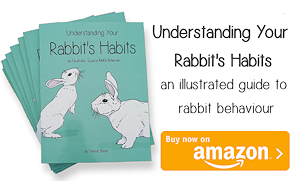Weight Gain Diet for Underweight Rabbits
Rabbit's digestive systems are very efficient at squeezing every last bit of nutrition out of their food so a rabbit generally only becomes underweight if there is an underlying medical condition causing the problem.
If you are reading this because your rabbit is underweight then you must get your rabbit checked by a veterinarian as the first step to resolving the problem.
Presuming you have already done this and your rabbit is undergoing treatment or recovering then read on for help putting weight back on your rabbit.
To help a rabbit gain weight, we need to increase the calories their diet provides whilst still providing plenty of fibre to ensure good gut function. The best way to do this is to pick higher calorie varieties of the same types of food your rabbit eats normally.
Hay
Hay that is green and leafy (as opposed to golden) will have the highest protein/fat values; second cut grass hay is usually higher than first cut. Depending on how you buy your hay you may find that nutritional information is displayed on the packaging as it is for pellets. Barn dried grass such as Readigrass is both palatable and slightly higher in nutritional value than standard hay.
Alfalfa is also a good way to increase protein levels whilst still providing plenty of fibre. It's often fed to young rabbits but is also good for putting weight on adults. It does have higher calcium content than grass hay though, so if the cause for the weight loss was related to calcium issues such as bladder sludge you may want to discuss this with your vet before feeding it.
If you rabbit has been reluctant to eat hay, then gradually introducing fresh grass can encourage them to eat and provide fibre, again grass from new growth will have more nutritional value that older leaves.
Dry Food
Dry food provides highly concentrated easy to digest nutrition, which is why it is restricted for adults. When trying to increase a rabbit's weight, increasing the dry food is a very simple way to increase calories intake.
If you are feeding a low protein/high fibre pellet (which is a great choice for healthy adults) you could try mixing in some pellets aimed at young or breeding rabbits. These will have higher protein/calorie content so you can increase calories without needing to increase the volume as much, which is particularly handy if your rabbit has a tendency to stop eating hay if they have too many pellets available.
Fresh Foods
If your rabbit is used to eating fresh foods, you could consider introducing small portions of fruit and root vegetables such as apple, carrot, parsnip and sweet pepper. As these plants store energy in the roots and fruits they have more calories than leafy greens. It's not the most efficient way of increasing calories but if your rabbit is reluctant to eat then tasty foods are good to tempt them. Oats One food that is very good for putting weight on rabbits is rolled oats/porridge oats. You can buy these from the supermarket or a feed supplier. You can feed small quantities, e.g. a teaspoon, dry but I recommend mixing them with a little water to make 'porridge' before feeding as they do swell quite a bit. Around a tablespoon a day is generally plenty. They are generally well tolerated by rabbit's digestive systems but it's worth starting with a small portion to check they don't cause your rabbit a problem.
Oats are particularly good if the weight loss is because your rabbit has been reluctant to eat as they are generally considered very tasty by rabbits. You can also mix other ingredients into the porridge such as recovery powder (powdered pellets), vitamin supplement, medication or finely chopped hay depending on your rabbit's needs.
Caution Over Diet Changes
Changes to a rabbit's diet should be done gradually, so your rabbit's gut can adjust to processing the new foods. Many of the changes here are tweaks to a standard rabbit diet which should make changes easier, however you'll need to consider what your rabbit is currently eating and not add a lot of new foods at once.
Whilst it's tempting to try and feed up a rabbit that looks underweight, a slow steady weight gain is healthier than a sudden one. Often weight loss is associated with muscle loss, so weight gain is slower as you aren't just fattening up your rabbit but supporting new muscle development.
















